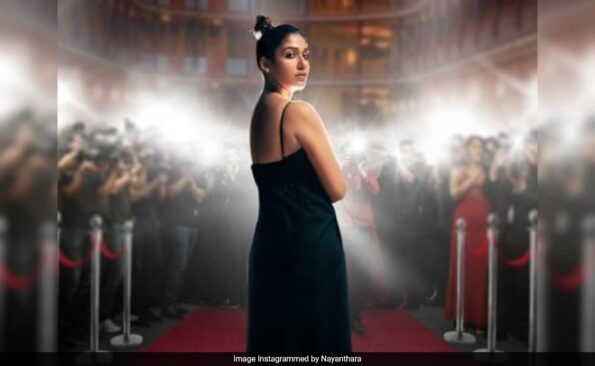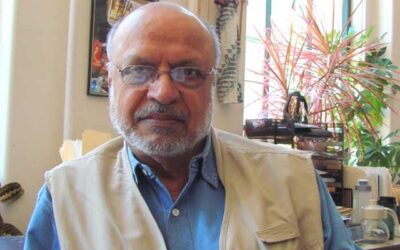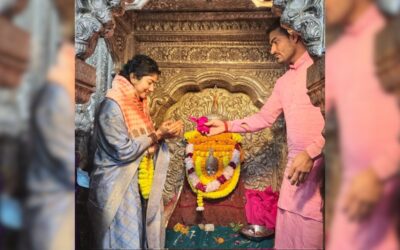Nayanthara: Beyond The Fairy Tale Review: The Documentary Serves Its Purpose To Perfection

In an industry overwhelmingly dominated by men, Nayanthara is a rarity. A “lady superstar” who earned her spurs the hard way and went on to upend many an established showbiz norm, she has over the years fronted numerous big South Indian films that have ridden on her crowd-pulling prowess.
This self-produced Netflix documentary seeks to capture the rise and rise of Nayanthara in the face of several reverses. It isn’t an objective account but, notwithstanding the limitations of its format, Nayanthara: Beyond The Fairy Tale is entertaining and insightful.
The date of the documentary’s release coincides with Nayanthara’s birthday – the actor was born on November 18 forty years ago. It is a celebration of her life and career. Needless to say, it isn’t commonplace for a female star in India to receive full-fledged documentary treatment.
Nayanthara: Beyond The Fairy Tale does a more than decent, if somewhat incomplete, job of presenting an appraisal of her breakthroughs as an actor and a star with a fan following that could rival, if not surpass, that of any major male A-lister.
On the flip side, the documentary is like two separate films. One half of it focuses on the transformation of an industry outsider, an accidental actress as it were, into an authentic power player in an industry where female actors have to contend with notoriously limited shelf lives.
The other half of the film is a sharp detour into Nayanthara’s “dreamy” wedding with Vignesh Shivan, who directed her in Naanum Rowdy Dhaan (2015). The two fell in love, courted each other for several years, got married and are now parents of twin boys. This part of the story is told largely in the couple’s own words.
A film crew was granted access to the wedding preparations and what they recorded is accorded plenty of screen time. As a result, the documentary does not seem to go as far “beyond the fairy tale” as it could have.
However, the wedding – the culmination of Nayanthara’s search for true love, which, to her mind, is “the most difficult thing” of the world – is not wholly extraneous to what the film seeks. But it is at its best when it shines a light on Nayanthara the true-blue, never-say-die professional.
A sizeable swathe of the 82-minute film dwells upon the highs and the lows of Nayanthara’s two-decade-long journey in the movies. Co-actors and directors share their experiences with the star-actor who has steadily worked her way to a position where she wields the kind of power that is usually out of bounds for female actors.
The film includes reminiscences and opinions of the likes of actors Rana Daggubati, Vijay Sethupathi, Parvathy Thiruvoth, Tamannaah and Nagarjuna, directors Vishnuvardhan, Krish Jagarlamudi, Atlee and Nelson Dilipkumar (one of Vignesh’s closest friends) and Nayanthara’s mother Omana Kurian.
They help director and editor Amith Krishnan piece together a story that is of special significance at a time when female actors (especially in Kerala) are in the middle of a war for gender parity and security.
An actor at the forefront of Kerala’s Women in Cinema Collective stresses that Nayanthara made her moves to assert herself in the movie industry at a time when “being a powerful woman was akin to witchcraft”.
Another contemporary of hers points out that Nayanthara disavowed us of the notion that a female actor’s status is determined by the male actor she is paired with. Since the mid-2010s, Nayanthara has carried a string of films on her shoulders, radiating girl power of an unprecedented kind and degree.
The honorific bestowed upon her by the industry and her fans tells a story all right. But it did not come to her on a platter. Earning it took some doing. But it sits pretty on the actor who has weathered many storms – brutal criticism, a messy break-up, a forced sabbatical after one of her most memorable career highs, and mistakes that almost did her in.
But not only has she kept going in the face of these challenges but has also famously used the disappointments as opportunities to alter the course of her career to her own – and the industry’s – advantage.
It would be impossible for a documentary of this length to find space for all, or even most, of her 75-plus films. Nayanthara: Beyond The Fairy Tale mentions only a handful of her superhits, with the directors and co-actors providing fleeting inside information on the genesis and execution of the films.
The tale begins of course with her birth into the family of an Indian Air Force officer and his homemaker-wife (whose role in Nayanthara’s life is repeatedly emphasised) and ends with a grand wedding attended by several luminaries of the Tamil and Hindi movie industries.
As has been emphasized already, the portions centred on her professional achievements needed to be substantially expanded for this film to fully drive home the magnitude of what Nayanthara has accomplished, and to dive deeper into what makes her the powerhouse she is.
Not that Nayanthara: Beyond The Fairy Tale does not provide glimpses of the turning points of the actor’s career. These are just fleeting flashes, not sustained spotlights. But all said and done, the extended peep into the actor’s home, life and love story is bound to be a huge draw for the star’s fans.
After being spotted by Malayali director Sathyan Anthikad in a print ad and cast in Manassinakkare (2003), a film that she did for a lark and thought would be a one-off, she took next to no time to find more takers. Films starring Mohanlal, Rajinikanth and Nagarjuna fell on her lap and she quickly established herself as a major female star across Malayalam, Tamil and Telugu cinema.
The documentary highlights the personal setbacks that she faced in the first decade of her acting stint, one of which nearly put paid to her career. The low phases threatened to stop her in her track but each of them eventually assumed the form of an incentive for her to reinvent herself.
By her own admission, her lowest point was the film Ghajini. The documentary pauses to let us read a sentence from a particularly damning review of her performance in the film: “An annoying, overweight Nayanthara, whose rolls of fat appear to be a doing a Mexican wave across her waist in a song sequence.” Ouch!”
The brazen body shaming strengthened her resolve. Within the next couple of years, she figured in a bikini scene in Billa. It was an issue for everybody, she recalls. It was necessary, so she did it, Nayanthara asserts. She wasn’t, she insists, trying to prove a point. If nothing else, the act of defiance was a testament to her confidence as a professional willing to do whatever it takes to do justice to herself and her work.
The two banners behind the film – Rowdy Pictures and Wikkiflix – are owned by Nayanthara and Vignesh Shivan. The result could easily have been a dull hagiography. From the perspective of the actor’s fans, the documentary serves its purpose to perfection. So, expect them to hang on to everything that it has to say about Nayanthara and her place in the industry.
Search
Recent
- Delhi gangster, 2 others shot dead in Haryana hotel parking after birthday party
- Congress moves to douse Pushpa fire, says Telangana CM Revanth Reddy not against Telugu film industry
- Congress moves to douse Pushpa fire, says Telangana CM Revanth Reddy not against Telugu film industry
- For Hyd, Shyam Babu was much more than just a filmmaker
- Cabinet meet on Dec 30, to take call on Rythu Bharosa





